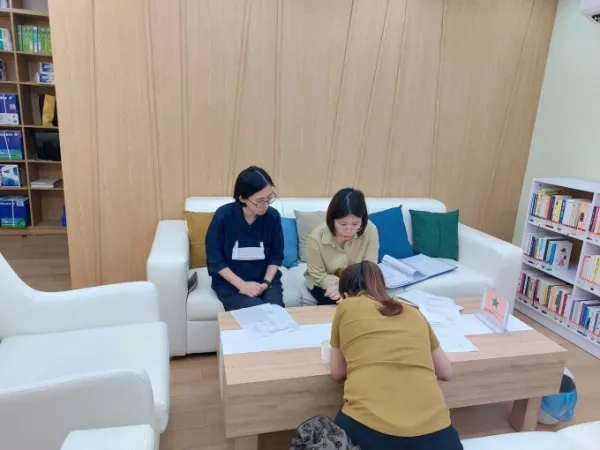
It was 2018, and Hai, a native of Hoa Binh Province in northern Vietnam, was on her first visit home after two years of marriage and living in South Korea .
“My dreams of a stable life shattered,” she recalls.
Hai’s husband, a driver in Daegu, South Korea, was 20 years her senior. The couple met only once in the summer of 2016 before deciding to marry. After seven months of language training she moved to South Korea, where she lived with her husband’s elderly parents. He worked long hours and came home only once a week.
Life in South Korea was nothing like the romantic dramas Hai had seen on TV. She often felt sad, especially during Daegu’s harsh winters. While waiting to find a job, she enrolled in Korean language classes at a local cultural center.
After suffering a miscarriage, Hai experienced insomnia and intense homesickness and cried frequently.
During her second pregnancy, her mental health worsened, and she began talking to herself. Her mother-in-law took her to several hospitals and therapy centers, but her condition did not improve.
Hai eventually returned to Vietnam for treatment. After three months, her mental state began to stabilize, but her husband’s calls and messages became increasingly infrequent. He later requested a divorce, citing concerns that her illness might return.
“I was completely devastated and lost,” she says.
She cried throughout her pregnancy, was mentally unstable and often unable to distinguish dreams from reality. Unable to work, she was entirely dependent on her aging parents, who were farmers.
On the day she gave birth, Hai broke down in tears knowing her family had to borrow money to cover the costs. More than a year later, she traveled back to South Korea to finalize the divorce. Returning to Vietnam, she struggled to find employment before eventually landing a job at a nearby garment factory. Since 2019, she has relied on antidepressants.
“In my hometown, it’s rare for men to accept a divorced woman who also struggles with fertility,” she says.
|
A bride and a groom holding each other’s hands. Illustration photo by Pexels |
Hai is one of 27,400 Vietnamese women who divorced South Korean husbands between 2000 and 2024, according to data from the South Korean government. On average, one in every five Vietnamese women married to South Korean men ends up divorcing.
A 2024 report from South Korea’s Ministry of Gender Equality and Family said Vietnamese women had the highest divorce rate among all cross-cultural marriages in the country.
Some 10% of these women have returned to Vietnam.
“Unemployed, burdened by debt and without a stable income, they return home becoming one of the most vulnerable groups,” Hwang Kwi Ja, director of the Korean Center for United Nations Human Rights Policy (KOCUN), an organization that supports migrant and repatriated women, says.
Lawyer Le Hong Hien of the Hanoi Bar Association, who has assisted many Vietnamese women in divorce cases with South Korean husbands, says most of them suffer from “broken expectations.” Many marry through matchmaking agencies with little time to get to know their future spouse, often live in rural areas, face cultural and language barriers, care for elderly in-laws, and marry men with low incomes—all of which fuel marital conflicts.
Hoang Thi Ha, head of a support group for Vietnamese women in Incheon, South Korea, says some 82% of these Vietnamese divorcee face severe financial hardships and are single-handedly raising their children.
Hwang says Vietnamese women frequently struggle with legal challenges after divorce due to limited access to information and unfamiliarity with the legal system, and some resort to costly middlemen, which deepens their debt and prolongs their poverty.
Economically, they miss out on career opportunities, lack job skills and work experience, and bear additional burdens such as the costs of repatriation and divorce proceedings. Reintegration into Vietnamese society is also difficult. Many returnees face social stigma, and are often labeled “failures” and viewed as burdens on their families and communities.
“This causes deep psychological wounds—feelings of inferiority, low self-worth, and isolation after enduring domestic violence or the trauma of divorce,” Hwang tells Read.
 |
|
A Vietnamese woman married to a South Korean man at the consultancy office of the Korean Center for United Nations Human Rights Policy (KOCUN) in Hai Phong, Vietnam, April 2025. Photo courtesy of KOCUN |
Thanh Thao, 43, of Hai Phong, knows this struggle all too well. She has faced it alongside her son, Kim Min Jun, since returning to Vietnam.
Thao married through a matchmaking service in 2006, but was disillusioned upon arriving in South Korea. Her husband, 24 years older, was an unemployed alcoholic who had been divorced four times. They lived in a remote mountain village near the border, where she was forced to live with his son from a previous marriage, who was four years older than her.
In 2009, when her son was two, Thao used her father’s illness as a reason to return to Vietnam. Her husband accompanied her and took all her documents, including her passport, to prevent her from fleeing.
While in Vietnam, he continued to abuse her while drunk. Fearing for her safety, Thao ran away. Two days later, unable to find her, he returned to South Korea and told the matchmaker that she had “fled.”
Thao then worked as a dishwasher in HCMC and later moved to Hanoi, where she found work as a domestic helper.
“What pains me most is that my son became a ‘phantom child’ with no official documents or legal identity in Vietnam,” she says.
Her son Kim has South Korean citizenship, which meant his Vietnamese visa had to be renewed every three months, an expense Thao could not afford. His father kept all the boy’s documents, including birth certificate and passport. As a result Kim was unable to attend school.
In 2010 her husband unilaterally filed for divorce so he could marry a sixth wife.
However, legal complications meant Thao never received an official court ruling. It was not until two years later, with help from Hai Phong authorities and KOCUN, that she was finally able to obtain legal documents for her son.
As for Thao herself, despite her marriage ending over a decade ago, she has never been able to legally confirm her single status. As a result, even after she met a man and had two daughters with him, they were not able to legally marry.
Her new partner died in a traffic accident in 2021 when the two were still not recognized as husband and wife.
Lawyer Hien says the best way to avoid such tragedies is for Vietnamese women to spend more time learning about South Korean culture, lifestyle and, especially, their prospective partner. They should also proactively seek out information on how to contact the Vietnamese embassy and connect with Vietnamese communities and support networks in South Korea.
Hwang recommends that repatriated women reach out to programs like KOCUN for support, a fresh start and help reintegrating into society.
“Women should equip themselves with job skills or vocational certificates to achieve financial independence or join local training programs,” she advises.